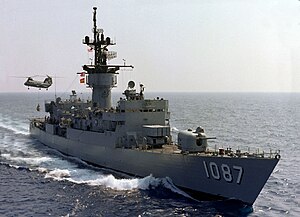USS Kirk

 USS Kirk | |
| History | |
|---|---|
| Name | USS Kirk |
| Owner | United States: Leased to Taiwan |
| Ordered | 25 August 1966 |
| Builder | Avondale Shipyard, Westwego, Louisiana |
| Laid down | 4 December 1970 |
| Launched | 25 September 1971 |
| Acquired | 27 August 1972 |
| Commissioned | 9 September 1972 |
| Decommissioned | 6 August 1993 |
| Stricken | 11 January 1995 |
| Fate | Transferred to Taiwan, as Fen Yang |
| Name | Fen Yang (Chinese: 汾陽) |
| Acquired |
|
| Commissioned | 6 August 1993 |
| Identification | 934 |
| General characteristics | |
| Class and type | Knox-class frigate |
| Displacement | 3,221 tons (4,202 full load) |
| Length | 438 ft (134 m) |
| Beam | 46 ft 9 in (14.25 m) |
| Draught | 24 ft 9 in (7.54 m) |
| Propulsion |
|
| Speed | over 27 knots (50 km/h; 31 mph) |
| Complement | 18 officers, 267 enlisted |
| Sensors and processing systems |
|
| Electronic warfare & decoys | AN/SLQ-32 Electronics Warfare System |
| Armament |
|
| Aircraft carried | 1 × SH-2 Seasprite (LAMPS I) helicopter |
USS Kirk was a Knox-class destroyer escort, originally designated as DE-1087 and reclassified as a frigate, FF-1087 (1975), in the United States Navy. Her primary mission of ASW remained unchanged. She was named for Admiral Alan Goodrich Kirk. She is in service with the Taiwanese navy as the ROCN Fen Yang (FFG-934).
Her contract was awarded to Avondale Marine on 25 August 1966. Kirk was laid down on 4 December 1970, launched on 25 September 1971 and commissioned on 9 September 1972.
Service history[edit]
In April 1975 Kirk participated in Operation Eagle Pull, the evacuation of Phnom Penh, Cambodia, and Operation Frequent Wind, the evacuation of Saigon, Vietnam.[1]
As part of the U.S. fleet sent to facilitate the evacuation of Americans from South Vietnam, USS Kirk carried out one of the most significant humanitarian missions in U.S. military history. Commanded by Commander Paul H. (Jake) Jacobs and under the direction of a civilian, Richard Armitage, Kirk rescued the remainder of the South Vietnamese Navy[clarification needed], consisting of 18 ships and tens of thousands of Vietnamese refugees, leading and protecting the flotilla from Vietnamese waters to the Philippines. From there, most of the refugees ultimately emigrated to the United States.[2]
During the evacuation, the Kirk became a makeshift landing pad for a stream of fourteen helicopters flown by South Vietnamese airmen fleeing for their lives with their families and friends on board. Having only a small flight deck, Kirk had nowhere to store the helicopters so the crew pushed all but three overboard into the China Sea. Early one morning while on station, the crew of the Kirk rescued two Marine pilots after their USMC AH-1J Cobra gunship crashed into the ocean near the ship. This was the last helicopter-gunship to be lost in Vietnam. The final refugees the Kirk received were literally tossed out of a hovering Boeing CH-47 Chinook that was too large to land on Kirk. Once the passengers were safely aboard, the pilot steered the craft about 50 yards aft of Kirk's stern, and jumped from the hovering helicopter. The craft then crashed into the water over the submerged pilot. He successfully surfaced and, after rescue by Kirk sailors, joined his family on board the American frigate.[3]
In 2010, under the direction of VADM Adam Robinson, then Surgeon General of the U.S. Navy, the U.S. Navy created a documentary entitled The Lucky Few. It has since been translated into Vietnamese as well.
Decommissioning and Taiwanese service[edit]

She served in the U.S. Navy up until 6 August 1993, when the ship was decommissioned and leased to Republic of China Navy in Taiwan. In Taiwanese service she was renamed Fen Yang (Chinese: 汾陽) with the hull number changed to 934. On 29 September 1999, the ship was finally purchased by Taiwan.
See also[edit]
References[edit]
- ^ By Sea, Air and Land: An Illustrated History of the U.S. Navy and the war in Southeast Asia Chapter 5: The Final Curtain, 1973–1975
- ^ At War's End, U.S. Ship Rescued South Vietnam's Navy
- ^ Kennedy, Rory (Producer Director) (2015). Last Days in Vietnam. American Experience. WGBH Educational Foundation.
 This article includes information collected from the Naval Vessel Register, which, as a U.S. government publication, is in the public domain. The entry can be found here.
This article includes information collected from the Naval Vessel Register, which, as a U.S. government publication, is in the public domain. The entry can be found here.